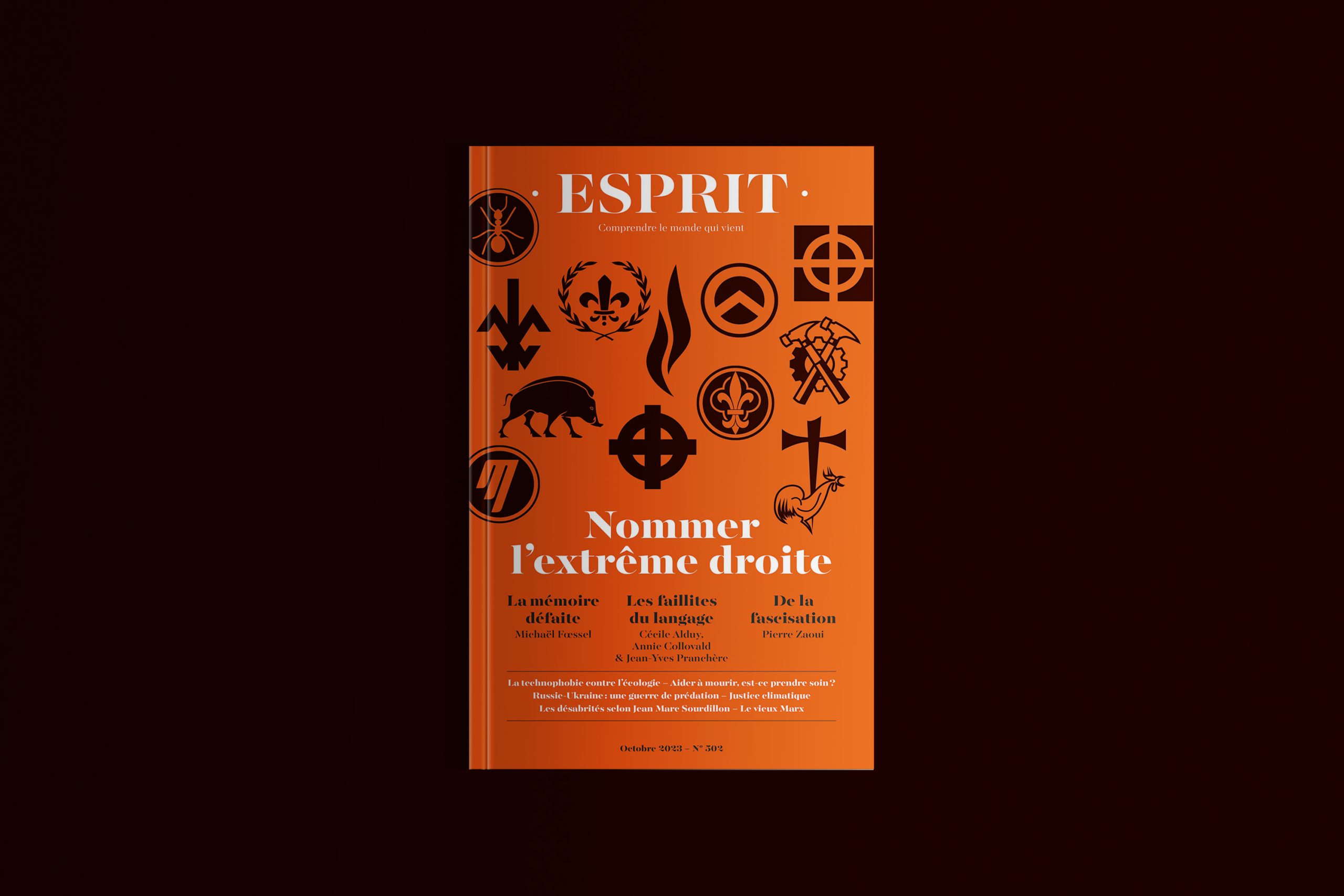Esprit on the French far-right: Why Marine Le Pen can’t shake off the radicals; how Vincent Bolloré’s media are going back to the ’30s; and what to do about fascist jouissance.
In an issue of Esprit focusing on the far-right, Nicolas Massol traces the evolution of the Rassemblement National (RN) over the last decade. What is the RN now, he asks, ‘a far-right party that is hiding its true nature’, or a ‘patchwork of nationalism, radical right-wing thought, populism, pragmatism, demagogy, and even some elements of progressivism?’
In 2013, the nationalist-racist writer Dominique Venner framed his suicide as an act necessary to shake the French from their lethargy and fight against the ‘great replacement’. When Marine Le Pen tweeted her admiration, no-one was surprised. But the ensuing decade has seen a U-turn: the party now rejects any affiliation with far-right figures, keeps those with links to violence or radicalism out of the spotlight, and gives star billing to new recruits from traditional parties.

The Front National used demonization as a strategy for decades, exploiting its position as outsider. But the RN (renamed in 2018) now prefers a theatre of (partial) de-demonization, in which Le Pen ‘now plays opposite Éric Zemmour’. With 88 deputies in the National Assembly since 2022, the RN’s new goal is to blend in. Its political strategy is ‘constructive’; since 2022, it has presented only consensus-building proposals, none of which relate to immigration or ‘préférence nationale’ – though this doctrine of giving French citizens priority for jobs, social assistance, and housing remains RN policy.
Yet despite the repositioning, the networks of the far-right are still interwoven and essential to the party. One example is e-Politic, the RN’s communications provider, and a feeder organization for the party. The RN keeps it at arm’s length due to the radical politics of its shareholders, but cannot cut ties with it. The last decade has thus been marked by incoherence: ‘Steeped in a far-right ideology that they are no longer allowed to openly embrace, RN activists now belong to a party without a real common culture.’
Back to the ’30s
Alexis Lévrier challenges the euphemistic description of contemporary far-right media outlets in France as ‘pluralist … spaces that respect all opinions’. It is a denial, he argues, of the continuity of a ‘nationalist and xenophobic journalistic tradition’ that began in the Belle Epoque and flourished until the end of the Second World War.
Lévrier examines France’s far-right media, focusing on the empire of tycoon Vincent Bolloré, which includes CNews and since earlier this year the Journal du dimanche (JDD), now with the far-right journalist Geoffroy Lejeune at the helm. Like the historical far-right press, these outlets see themselves as defending ‘a France under threat … corrupted by the presence of the enemy within’. The scapegoating of the ‘unassimilable foreigner’ continues too, with the rolling news channels constantly repeating ‘their accusations against Muslims and communities of foreign origin’.
At the JDD, Lejeune infuses every issue with his ‘identitarian obsessions’. Echoing the ‘linguistic excesses’ of the 1920s and ’30s, today’s far-right press calls into question democratic institutions, portraying them as ‘corrupt elites, under foreign influence, and incapable of defending the national interest’. A polemical style and ‘a taste for conflict and outrage’ have become its defining features, with centrist and leftwing guests on CNews attacked in an ‘almost ritualized manner’. Yet, despite this tone of violence, these platforms deny the influence of any ‘far-right’ ideology.
But this may not be the case for much longer. Éric Zemmour, a key figure at CNews, has never hidden his fascination with notables of the historical far-right. His ‘radicality and candour’ have won him supporters and made him ‘a pioneer and a model for a generation of journalists who today burn with desire to follow his example’. The new team at the JDD, some of whom are particularly anchored in the far-right, are indebted to Zemmour for bringing a long-reviled discourse in from the cold.
Fascization
The far-right is on the rise in Europe – but are these parties and their supporters fascist? It’s a futile debate, argues Pierre Zaoui. More fruitful is to recognize the ‘fascization’ that has been at work in European societies and beyond since the 1980s. This process, like ‘racization’– a ‘social process that constructs the Other’– operates through ‘language, bodies [and] flows’, and Zaoui offers ‘practical lessons’ to stem the tide.
In a society undergoing fascization, language transforms in an ‘impersonal and almost autonomous’ way. At first, it is ‘babbling and inchoate’ but, as it spreads through our social spaces, fed by media, rumours, and the discourse of powerful businesspeople, it takes shape. Eventually, the ‘terrible fascist language’ emerges. This distinguishes between ‘friends and enemies, them and us, here and there’ and, through ‘the use ad nauseam of a vocabulary of extermination’, legitimizes violence against the Other.
The signifiers of this violence as much as the act itself produce a physical thrill. This, often secret, jouissance in exterminating the weak flows through our societies, ‘through all social bodies’, touching everyone. To avoid submersion, we must build barriers: electoral, when we have the right to vote; linguistic, when we refuse the lexicon of extermination; and bodily barriers to beat back the fascists ‘in the street, in the football stadiums, or in Ukraine’.
Unlike the fight against fascism, which involves arms and is a fight to the death, that against fascization is ‘more multiform, and less violent’. It requires each person to root it out of themselves at the same time as they oppose it in others.

Published in cooperation with CAIRN International Edition, translated and edited by Cadenza Academic Translations.
Published 2 November 2023
Original in English
First published by Eurozine
Contributed by Esprit © Eurozine
PDF/PRINTNewsletter
Subscribe to know what’s worth thinking about.
Related Articles

Slovakia’s right-wing nationalist minister Martina Šimkovičová is waging an ideological war on the country’s independent arts and media sector, targeting cultural institutions, discriminating against LGBTQIA+ organizations. Though fearing for their safety, cultural workers are fighting back via collective action, supporting those on strike.

Europe is facing not only Orbán’s autocratic turn but also that of his ‘apprentice’: Slovakia’s prime minister, Fico, has taken an advanced course in attacking his country’s judiciary, media and cultural institutions. His first goal: to get away with it, say beleaguered intellectuals, theatre directors, political scientists and investigative journalists from Bratislava.





